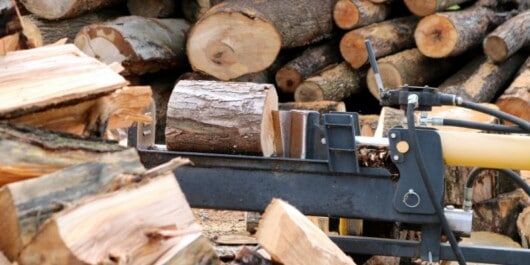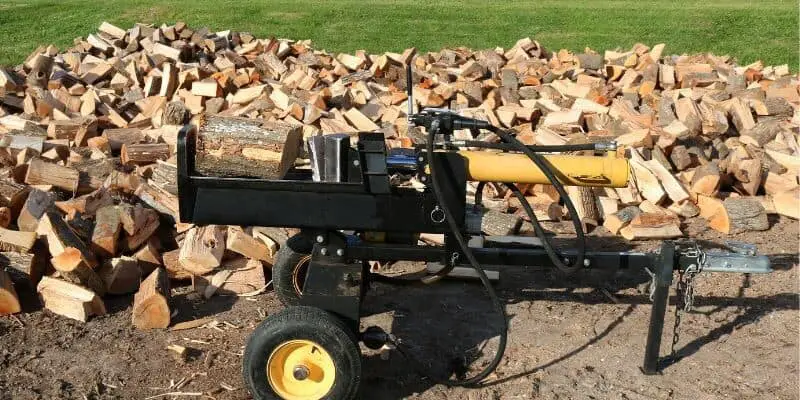Are you a homeowner who has to split logs frequently, and you’re pondering over the option of buying a log splitter? If so, then you’re definitely in the right place.
Is a log splitter worth it is something that most homeowners wonder before they decide to invest in a costly log splitting machine. There are many factors that define is it worth buying a log splitter, such as how frequently you have to split logs, the diameter of logs you have to split, the type of wood you’re splitting, how quickly you want to split logs, etc. If all these factors are fulfilled, then your choice to go for a log splitter will be worth it. Meanwhile, there’s no point in buying a log splitter if you’re only going to use it sparingly for a few pieces of wooden logs.
In this article, you’ll get to know all about log splitters, is a log splitter worth it, different reasons to buy a log splitter, what to look for in a log splitter, and more. Continue reading to know more and get all the answers that you’re looking for.
Is a log splitter worth it?
Should you buy a log splitter, do you really need one, and how much will it cost? These are some of the questions that homeowners ask before purchasing a log splitter. Unless you’ve been around firewood your entire life, it’ll be a tricky question to answer.
There are many factors to consider when you’re thinking of whether to purchase a lot splitter. Some of the common ones include the up-front cost, gas or electric log splitter, what size of log splitter do you need, how many logs will you be splitting, and more. These are genuine concerns, and all of them are important when it comes to deciding is it worth buying a log splitter.
However, there is one thing that most people don’t think of when they’re a newbie, and it is how much of a toll splitting wooden logs with an axe or maul will do to your body over the years. Even if you’re using the best axe to split wood, after a while it can get tough, tiring, and mundane. This is something that you might not consider when you’re a newbie. You might think, if you’re in great shape, you can get away with swinging an axe for splitting logs. However, after a while, it’ll take a toll on you. This is where a log splitter will be helpful and save the day.
If you’re wondering whether to buy a log splitter, then the answer is an obvious yes.
Why do you need a log splitter?
There are many reasons for you to own a log splitter, and next to no reason to not own one. The only reason why you shouldn’t own a log splitter is if you cannot afford a high cost.
The huge amount of time and effort that a log splitter will save you is one of the biggest reasons why you should look to own one. Not needing to spend so much time splitting logs the old-fashioned way would help free you up to do other things. This way, you’ll be able to do other chores during your spare time. By the time you’ve split a few rounds using an axe, you would have been done for the day if you’re using a log splitter.
If time is a big consideration for you, then it is recommended that you should go for a kinetic log splitter. These powerful machines come with incredibly quick cycle times and will help you split logs with ease. It can easily turn 3 hours of splitting down to under an hour, with cycle times as low as 2 seconds.
Sometimes, when you’re splitting wooden logs using a maul or an axe, you’ll come across logs that you cannot getting through. Regardless of how hard you try and the number of attempts you make, some logs are simply too stubborn for a traditional axe.
This is, unless you’ve got a high-quality log splitter capable of splitting right through the stubborn log. For most situations, a 22-ton log splitter should be your weapon of choice. This is a remarkable entry-level machine that you should go for. A 22-ton machine will be capable of offering plenty of splitting force and get through most stubborn logs. Another great thing about 22-ton log splitters will be that this is where they start adding to being towable and the fact that it will give you the ability to split vertically.
How much does a log splitter cost?
While this is all well and good stating that yes you should get a log splitter, however, it isn’t as simple as just going out and getting one. Once you consider the upfront cost of some of these log splitters, it can be slightly daunting and even off-putting for many people, and it’ll be a genuine concern. Some log splitters can go as high as costing several thousand. However, on the other end of the scale, you’ll be able to get a decent log splitter for a few hundred dollars. It’ll ultimately come down to knowing what you require and what you don’t require.
The question that you have to answer here is, do you really require a heavy-duty log splitter? If you are only going to split 1-5 cords per year with logs that aren’t that hard or knotty, then you won’t probably require such a large machine. If you do your research, you can easily find a wonderful log splitter that won’t break the bank. You’ll be truly surprised at the amount of speed and power you can get from a few hundred bucks in today’s market. If it sounds like a lot to you, then there are a couple of things to consider.

A small up-front cost now can save you big time down the road. It’ll be much cheaper to purchase your own log splitter than it is to rent one for years. If you know that you’ll be reliant on firewood for the home, it’ll make total sense to invest in a high-quality log splitter from the off. You shouldn’t go too cheap, or you might end up having to pay more eventually.
What do you need to log for in a log splitter?
1. Decide which log splitter is the right option for the job
Electric log splitters are generally cheaper compared to hydraulic models. However, they generally come with half the power that a decent hydraulic log splitter can provide. Electricity-powered log splitters, due to limited power, aren’t suitable for hard or green timbers. If you’re looking for the ability to split hard timbers, then a hydraulic splitter will do the trick.
When you’re researching petrol-powered splitters, look at the horse-power rating and the tonnage, as they’ll determine the power of the machine. In contrast, a 3-pt linkage splitter’s capacity will be determined not just by the horsepower rating and the tonnage, but by the tractor’s hydraulics too. If your budget allows you to afford a hydraulic log splitter, then it should be your preference over an electric log splitter.
2. Operational factors
Before you purchase the log splitter, you’ll need to consider the following – are you looking to split wood in a shed or in a remote area? Do you happen to own a tractor with hydraulics? Would you be doing light work near your home? These factors will help determine the type of log splitter that you’ve purchased. If you own a tractor with hydraulics, then you should consider a 3-point linkage model. If you’re doing light work close to home, then a decent electric log splitter might be suitable.
However, remember that you’ll require a power outlet. If you’re looking to invest in a quality machine with the best log splitting capacity and easy accessibility to timber, then a 3-point linkage splitter or a petrol-powered log splitter will be the best option.
3. Consider your safety and the log splitter ratings
One of the recent trends in the log-splitting market is that some machines are overrated in terms of their log-splitting capacity. Their ratings don’t actually match their performance. The bottom line here is that you should stick to a brand that is WorkCover compliant and will adhere to the OSHA Logging Safety Standards.
With all machinery purchases, you’ll need to ensure that the product adheres to the necessary US standards. Do not just assume that since it is sold in the United States that the product is compliant. Make sure that you ask the question. If the manufacturer or dealer isn’t able to prove that it is compliant, you must re-consider your purchase.
This is true for any piece of machinery that makes use of a PTO shaft. Always ask if the shaft is WorkCover compliant, as many shafts sold in the market aren’t, especially Chinese-manufactured shafts.
4. Easy handling and if you can split logs vertically/horizontally
Many hydraulic log splitters are capable of offering vertical and horizontal operations. This is especially useful for large logs, as the log splitter being in a vertical position will save your back from having the lift the heavy log onto the log splitter. Moreover, it’ll give you the option to push the log into place. Some log splitters on the market will also offer an “X-Wedge” attachment for four-way splitting, making them perfect for splitting kindling.
5. Consider the manufacturer and dealer support
When you’re looking for a log splitter, you need to be able to find a high-quality machine at a competitive price. Ensure that the log splitter can offer a proper warranty. Ask the supplier whether the importer or manufacturer stocks parts that can be accessed readily. Also, check for how long the manufacturer or importer has been selling log splitters. It’ll help you ensure that the business will still be around in case you have any issues in the future.
Moreover, you should always purchase the machinery from a reputed local machinery dealer. This way, you’ll have confidence in the product that it is properly warranted, and that you’ll have the support and backup if needed.
Conclusion
Thank you for reading. Hopefully, now you know a lot more about log splitters, is a log splitter worth it, different reasons to buy a log splitter, what to look for in a log splitter, and more. Is a log splitter worth it is something that most homeowners wonder before they decide to invest in a costly log splitting machine.
There are many factors that define is it worth buying a log splitter, such as how frequently you have to split logs, the diameter of logs you have to split, the type of wood you’re splitting, how quickly you want to split logs, etc. If all these factors are fulfilled, then your choice to go for a log splitter will be worth it. Meanwhile, there’s no point in buying a log splitter if you’re only going to use it sparingly for a few pieces of wooden logs.


